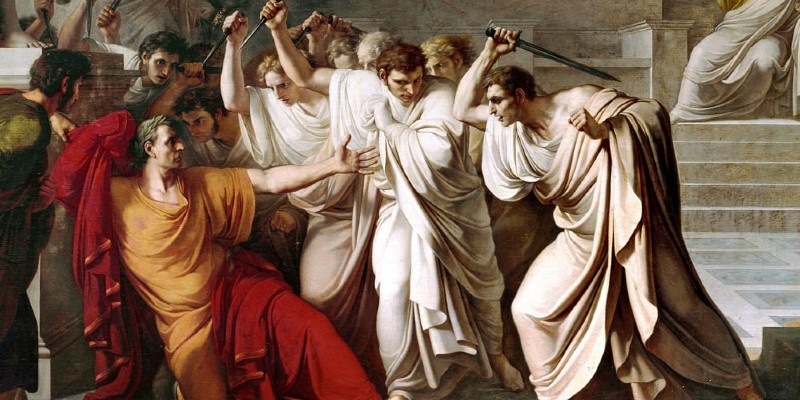Politics and murder are clever conspirators. Think of Brutus, Macbeth and all of Shakespeare’s bloodstained assassins. Pretty of word, cruel in deed. They scheme down hallways and along castle walls, driven by hubris, greed, revenge and a desire for power that eclipses the good once in them. Politics is venial sins spooling into tragedy; our best impulses turned sour. Not always, but often. In my years as a foreign correspondent, I covered war and politics in distant capitals, and was often struck by whispers and inlaid plots uncoiling beneath the headlines. Who would fall? Who would rise? Who were the kingmakers? Every calculated political design was a brushstroke in an ever-unfinished portrait. A mystery in real time. Once, in a restless Belgrade, Zoran Dindic, who would later become prime minister of Serbia, suggested with a wink to myself and a few other journalists that we delay our flights leaving the city. We did. That weekend Serbian President Slobodan Milosevic, known as the ‘Butcher of the Balkans,’ was arrested for his many crimes. Police raided his villa, where he was holed up with cigars, plum brandy and a screaming, pistol-wielding daughter. Dindic had been tipped off. He knew the final act. But what he didn’t know was that two years later, when he had risen to the height of power, an assassin with ties to the underworld would fell him with a bullet.
Politics.
A decade later, on the North African coast, I stood over the body of Libyan dictator Muammar Gaddafi. Killed after a mob pulled him from hiding in a drainage pipe, he lay in a souk, stripped to the waist, pocked by wounds, his trademark black curls, dull and fallen. So big he was in life to lie so small in death. Boys and men waited in line to see him. They spit and cursed him. He had taken the youth of old men and wrenched fear into the souls of their children. A perfect villain. Gone. But the politics played on over oil riches and desert tribes. New plots for theft, murder and deceit were made, and in Tripoli that night, while much of the city slept, you could hear the voices of men amid ruins dating back centuries ago to the Roman emperor Hadrian. History, it seemed, was one long crime novel, an endless terrain of infractions littered with culpability and cunning. Read the papers, let the imagination wander, and a story would appear.
That was true during the Cold War. Fog, trench coats, coded messages and double agents. John le Carre knew it well, and to me, a child of that time, the fate of the planet was in the pages of spy novels and black-and-white movies that glimpsed lives that were at once alluring and frightening. The Soviet Union collapsed but the Cold War never ended. It has been overshadowed at times by terrorism and global recession—and these days the coronavirus—but it spirals on even as Russia is much diminished. Russian President Vladimir Putin is the keeper of that dark vigil, a mercurial spy with an army who disposes his enemies, hacks elections and makes mischief in Ukraine and along the borders at the edge of Europe. To say nothing of strange sway he has over President Trump. A trove of novels could spring from Putin’s daily ledger, including the recent murder attempt on Alexei Navalny, an opposition leader and one of Putin’s harshest critics who was poisoned in Siberia with a nerve agent. He made it to a Berlin hospital and survived, like a plot twist in le Carre’s Tinker, Tailor, Soldier, Spy.
I am fascinated by the men and women who rule our lives. Their ambitions and their pettiness, the grand promises they once held that, along the way, have been reinvented into other things. Some have stayed true to how we first saw them; many have not. It is there, where misdeeds gather and ill fortune blooms, that crimes find air and rise. A person of seemingly no consequence is murdered and as the case unfolds it reaches toward prime minister, president and king. So many headlines to borrow from, so much corruption to sift. The intricacies of power are sharp as broken glass and woven with the sins of Dante’s ‘Inferno.’
President Hosni Mubarak found that out in 2011, when hundreds of thousands of Egyptians took to the streets in the early days of the Arab Spring. Snipers on rooftops, tanks on the boulevards, hired men on camels attacking protesters in Tahrir Square. Tear gas along the Nile, bloodied bodies carried into mosques. They moved so fast, those 18 days before his regime buckled and he flew away in a helicopter. One night, I left the protests and wandered down a nearby a street. Fires burned. Laundry hung from windows. Through the smoke and beneath a quarter moon, an elegantly dressed woman stepped from an apartment building and into a chauffeured car. She sped away. I did not know where she was headed. To the palace perhaps. I turned back toward the square. There was a lot of night left. I let my mind wander, fashioning her with a pistol, secret papers, a few passports and a twist of intrigue as the flags of rebellion flew in the last days of an empire.


















